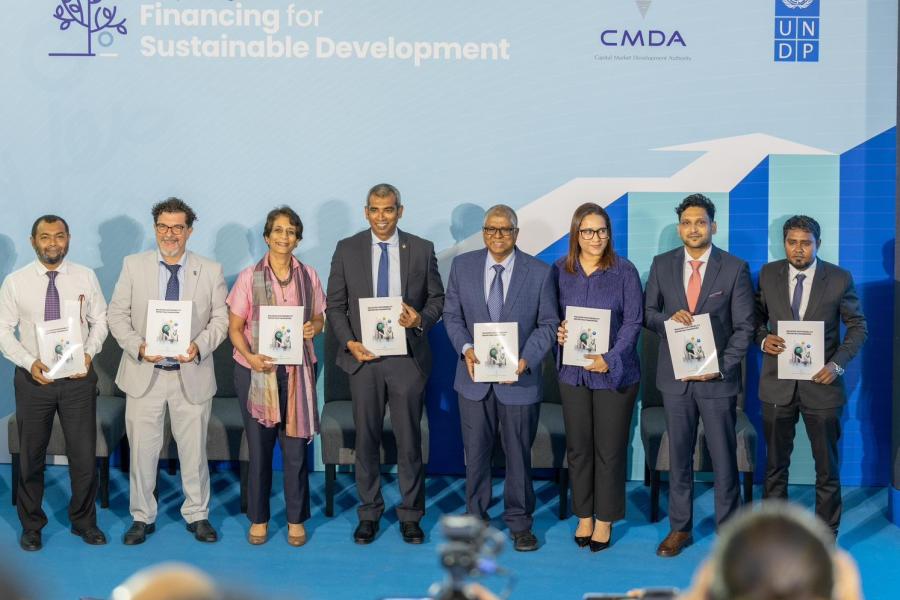Sustainability Reporting for More Resilient Islands

January 23, 2025
Demonstrating value beyond financial reporting
In October 2024, the Maldives reached a defining moment in its pursuit of sustainable development with the launch of the country’s first Sustainability Reporting Framework for the corporate sector. Developed through a collaboration between UNDP Maldives and the Capital Market Development Authority (CMDA), the framework marks a significant step toward embedding sustainability into the core of private sector operations.
This pioneering initiative sets the stage for mandatory sustainability reporting by 2027, aligning corporate practices with national priorities and global standards. It provides businesses with the tools to measure their contributions to the Sustainable Development Goals (SDGs), focusing on areas crucial to the Maldives, such as climate resilience, marine biodiversity, and governance.
For a nation that safeguards 79 Marine Protected Areas (MPAs) and 3% of the world’s coral reefs, the stakes could not be higher. As a Small Island Developing State (SIDS), the Maldives faces the dual challenge of fostering economic growth while protecting its fragile ecosystems from climate impacts. This framework empowers the private sector to become a key partner in addressing these challenges, ensuring that development is both inclusive and sustainable.
Increasing momentum
The framework also opens doors to innovative financing opportunities, such as green bonds, sustainability-linked loans, and carbon credits, enabling businesses to access sustainability-focused investments. By prioritizing transparency and accountability, it mitigates the risks of greenwashing and enhances the Maldives’ global competitiveness. Endorsed by four regulatory authorities, the initiative strengthens trust in the corporate sector while paving the way for resilience-building at both national and international levels.

Initial steps towards global alignment
“It seems a big ask: a unified reporting ecosystem grounded in globally adopted sustainability standards, delivering consistent, reliable metrics and disclosures that stand up to rigorous assurance. Yet, with strategic planning, clear focus, and the collaboration of key stakeholders, achieving globally consistent standards is well within reach," said Pek Chuan Gan, UNDP Deputy Resident Representative in the Maldives.
What’s next?
The launch of this framework is not merely about reporting; it’s about reimagining how businesses operate. Corporate sustainability shifts the corporate equation from the conventional parameters of risk and return by triangulating sustainability into the economics of doing business. This safeguard, against the risk of greenwashing, creates trust in the business of sustainability. These are businesses that are supported by systems of regulatory rewards such as carbon credits, habitat banking, and innovative forms of blended finance – which brings with them a prospectus of new investment, trade, and employment opportunities.
Against this backdrop of progress, Maldives today is building thematic sustainable investment pipelines such as in the space of the Blue Economy. With 24 out of 43 Small Island Developing States (SIDS) classified as middle-income countries, SIDS need to place priority on mobilizing more private finance to protect their marine assets and shores from the intensifying cost of climate change. Maldives, a champion of climate stewardship, is now gearing to position itself as an example in climate finance.
By shifting corporate metrics from traditional profit-driven models to sustainability-focused performance measures, the Maldives is setting an example for other SIDS and beyond. This initiative underscores that economic ambitions and social and environmental stewardship can, and must, go hand in hand.
Access the Maldives Sustainability Reporting Framework here
This article is first published at UNDP Maldives website on Sustainability Reporting for More Resilient Islands
To learn more about the works of UNDP in Maldives Please visit | Maldives | United Nations Development Programme



